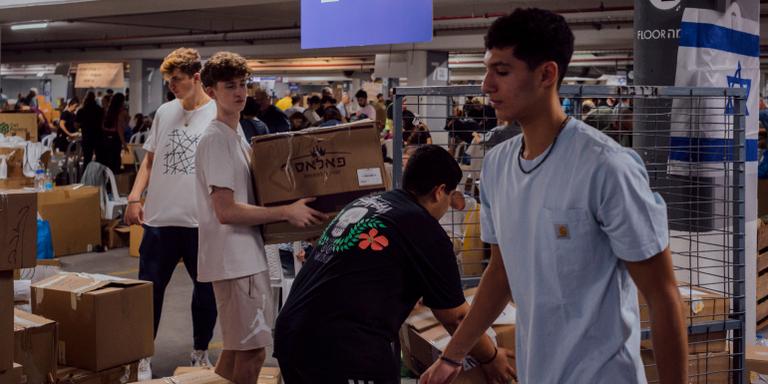


After Hamas attack, Israelis rally behind their army
FeatureIsraeli society has put aside its divisions to organize support for the victims of the Hamas attack and the war effort. With blood donations, collections of money, food and equipment, there are ever more numerous initiatives, particularly in Tel-Aviv.
Engulfed by the urgency of war, the panic of the first days and the disorganization of the state, the people have had to improvise, to save themselves by helping others, to act so as not to remain paralyzed in disbelief, afraid or angry. In Tel Aviv, as in many other towns and villages, countless initiatives have sprung up since the Hamas terrorist attack on Saturday, October 7, to help displaced Israelis and soldiers. This is a crucial grassroots battle, especially if the conflict is to last and result in further casualties in addition to the 1,400 Israelis killed in the Hamas attack and the 2,750 Gazans killed in Israeli army bombardments.
In the hustle and bustle of Tel-Aviv's exhibition center, transformed into a humanitarian hub, Nadav Salzberger, 28, described this new awakening in Israeli society. He heads the national students' collective against the policies of the Netanyahu government and has been involved in numerous demonstrations opposing the justice reform bill over the past year.
But all that became the past, everything changed in a few hours on Saturday morning. As the death toll began to rise and news broke on social media, Israelis discovered the scale of the attack and experienced profound seismic shock, not just at the number of dead, wounded and hostages, but also at the desecration of bodies, the violence against children and the cries of joy in the streets of Gaza at the sight of the hostages.

"On Saturday evening, our entire organization, which was used to rallying against Netanyahu, changed its nature: It became a humanitarian organization," said Salzberger. Starting with the WhatsApp and Telegram groups, which have relayed images of the terror caused by the Hamas attack, they have also shared solidarity operations. The 15,000 members of his militant group have become the worker bees of a social war movement, and the politics that motivated it instantly disappeared, replaced by a form of operational, practical, concrete patriotism, with everyone contributing whatever they can.
Orders all around the world
Thousands of Israelis have offered to cook and send food to displaced persons in kibbutzim near Gaza, or to soldiers sent away from their bases. Restaurant owners have joined them, using their resources, in a Tel Aviv emptied of consumers. Queues for blood donations have become interminable outside hospitals: There can now be up to seven hours' wait time. Companies have donated money and goods and asked their employees to volunteer. Citizens have offered to babysit while schools remained closed, or to become drivers. Others have sent crates full of items. In the basement of the exhibition center, where volunteers run for cover when Hamas rocket alerts sound in the middle of the day, hundreds of boxes are awaiting dispatch, with clothes, toys, food and medicines.
You have 51.33% of this article left to read. The rest is for subscribers only.
